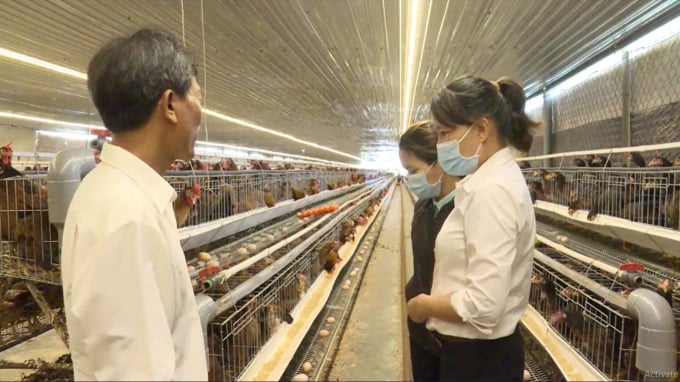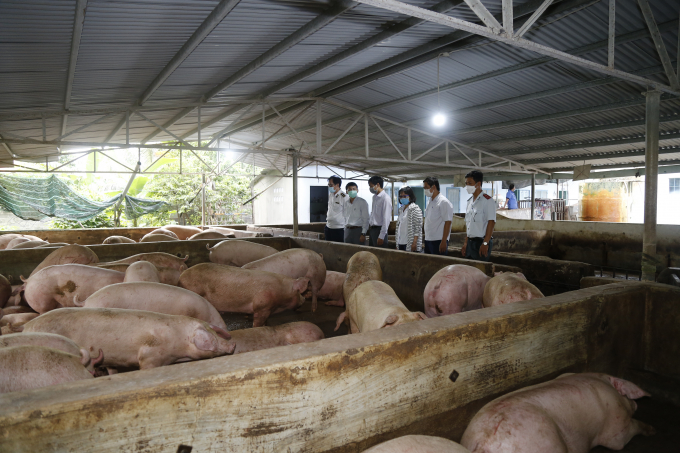May 19, 2025 | 20:29 GMT +7
May 19, 2025 | 20:29 GMT +7
Hotline: 0913.378.918
May 19, 2025 | 20:29 GMT +7
Hotline: 0913.378.918

Chicken hatchery of Phung Dau Son Poultry Breeding Company Limited in Suoi Tan commune, Cam Lam district (Khanh Hoa province). Photo: LT.
Mr. Le Tan Ban, Director of Khanh Hoa Department of Agriculture and Rural Development, said that in recent years, livestock and poultry raising in the province had changed fundamentally from household farming to farming raising, being controlled, applying for technical advances, biosafety, and minimizing environmental pollution.
Up to now, the province has 410 cattle and poultry farms. There are 31 large-scale livestock farms, 250 medium-sized livestock farms, and 129 small-scale livestock farms.
From the beginning of the year until now, the livestock production situation has been relatively stable. The disease only occurred sporadically in a few localities but was controlled in time to prevent widespread spread. Particularly for foot-and-mouth infection, blue ear disease in pigs did not happen.
By the end of October 2021, the total poultry herd in the province was 2,580 million heads (down 6%), 2,896 buffalo herd (down 9% over the same period last year), 61,150 cows (down 5% over the same period the previous year). Meanwhile, the total herd of pigs reached 348,170 heads (up 18.7% over the same period last year) and 2,058 million chickens (up 5% over the same period). Notably, about 80% of pigs and 50% of chickens are raised on farms.
At the recent meeting of the delegation of the Ministry of Agriculture and Rural Development with the People's Committee of Khanh Hoa province, the representative of the Department of Livestock Production highly appreciated the growth rate of pig farming in the past three years, even though livestock production in Khanh Hoa is not the critical sector.
Besides, the province has the second largest ostrich herd in the country and the third-largest sheep herd. In particular, Khanh Hoa province has a traditional profession of bird's nests, with the output of very high-value products accounting for more than 64% of the whole country.
In addition, in the past six years, the Ministry of Agriculture and Rural Development has supported the province to develop the original breed of Ninh Hoa curry chicken raised at Phung Dau Son Poultry Breeding Company Limited. Currently, this chicken breed is supplied to farmers nationwide with high quality. Therefore, the locality needs to continue to promote these advantageous indigenous genetic resources.

The delegation of the Ministry of Agriculture and Rural Development inspected the livestock production situation in Khanh Hoa province. Photo: KS.
According to Deputy Minister of Agriculture and Rural Development Phung Duc Tien, Khanh Hoa will be a city directly under the Central Government with a scale of over 2 million people, so meeting the food demand will be a big problem. While up to now, the scale of livestock, poultry, and pig herds in the area is still small.
"When we have a population of 2 million people, but we do not have a livestock strategy associated with aquaculture development, we will not be able to provide enough food," emphasized the Deputy Minister. To solve this problem, the Ministry of Agriculture and Rural Development will direct Khanh Hoa province to focus on implementing the livestock development strategy based on the Prime Minister's Decision 1520 on the livestock development strategy from now to 2030 and the vision to 2045. Food supply must also be proactive.
Regarding disease control in livestock, the Deputy Minister of Agriculture and Rural Development noted that for all diseases that must be vaccinated, such as foot-and-mouth disease, blue ear disease, and skin rash, the vaccination rate must be at least 80%. Recently, Khanh Hoa province has done relatively well in this regard. However, the slaughter part associated with the raw food processing needs to be improved, especially when Khanh Hoa orients develop into a centrally run city.
At the meeting, Mr. Dinh Van Thieu, Vice Chairman of Khanh Hoa Provincial People's Committee, acknowledged the comments of the delegation of the Ministry of Agriculture and Rural Development on orientation in livestock development. Simultaneously, the province will be determined to invest in a concentrated cattle and poultry slaughtering area to both ensure food safety and hygiene while ensuring disease prevention and control in the upcoming time.
Khanh Hoa province has tourism potential, so the demand for food for tourists will be very high, while with the current number of livestock, it cannot be met. Therefore, the Department of Livestock Production proposes that Khanh Hoa province continue to implement the Law on Livestock, along with early promulgating a strategy for livestock development to 2030; especially implementing the content of Directive 26 dated September 21, 2021, of the Prime Minister on promoting the production, circulation, consumption, and export of agricultural products in the context of the prevention and control of the Covid-19 epidemic, including livestock. In addition, Khanh Hoa province will promote the development of animal husbandry in the chain, traceability to ensure food safety, proactively source local food for tourism, and implement fully close livestock and animal husbandry.
Translated by Ha Phuc

(VAN) As a doctoral student doing research on renewable energy and electrification at Harvard University, the author shares his musings on electricity, nature, and countryside memories.

(VAN) The decree on Extended Producer Responsibility (EPR) ensures transparent management and disbursement of support funds, avoiding the creation of a “give-and-take” mechanism.

(VAN) Hue City rigorously enforces regulations regarding marine fishing and resource exploitation, with a particular emphasis on the monitoring of fishing vessels to prevent illegal, unreported, and unregulated (IUU) fishing.

(VAN) Hanoi People's Committee has issued a plan on reducing greenhouse gas emissions in the waste management sector with 2030 vision.

(VAN) Vietnam's draft amendment to Decree No. 156 proposes a mechanism for medicinal herb farming under forest canopies, linking economic development to population retention and the sustainable protection and development of forests.

(VAN) In reality, many craft village models combined with tourism in Son La have proven effective, bringing significant economic benefits to rural communities.

(VAN) The international conference titled Carbon Market: International experiences and recommendations for Vietnam was successfully held recently in Ho Chi Minh City.